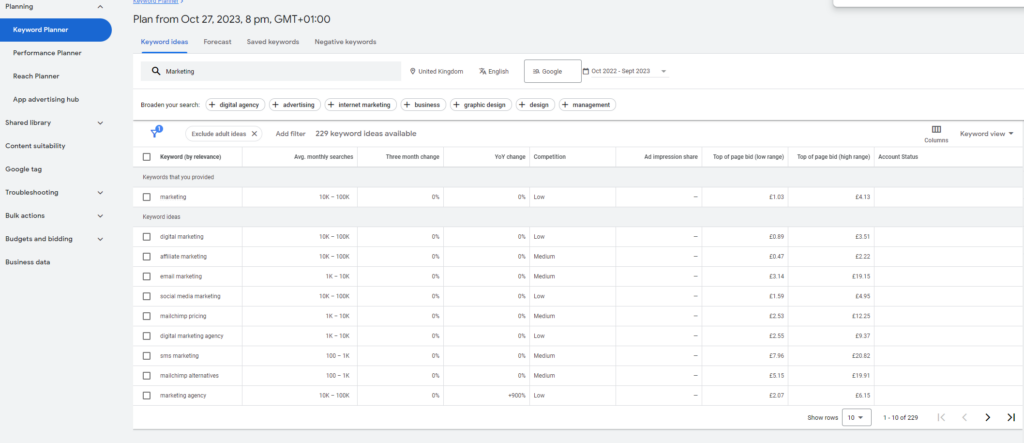want expert advice on your website? get in touch for a free website audit
book your free website audit
When it comes to creating a Marketing strategy, many businesses are quick to put SEO and PPC in two separate categories. While yes, they are two completely different things in the marketing world, they both have a lot of similarities. With both having a focus on search, keyword research, and driving traffic, it is a no-brainer to create a strategy where both elements combine. Putting a strategy that synergises both SEO and PPC, will help you drive results, both in the short-term and long-term, while also ensuring your strategy makes sense to achieving your business goals. You’ll also find yourself saving a lot of time and resources by merging the two. For example, when you conduct keyword research for your Google Ads campaign, you then have a bunch of effective keywords that you can use to create content for your website. You’re also able to have a much more blended approach in which you can specifically target your target audience. Some of the most successful companies merge the two to drive more traffic to their site.
What is SEO and PPC?
SEO, also known as Search Engine Optimisation, is the practice of optimising your website to improve its ranking in search engine results. The main goal of SEO is to boost overall organic traffic by targeting specific search terms and keywords. Through thorough keyword research and a well-thought-out strategy can help you boost visibility and build credibility of your website. Some things you may want to consider when starting with your SEO are:
- On-Page SEO: On-page SEO is the process of optimising the content on your website. It includes optimising aspects such as meta descriptions, improving content readability, and identifying headers within. your content, etc. By optimising this, it makes it easier for search engines to get a better understanding of your content.
- Off-Page SEO: This is all about what goes on outside of your website. Working on your off-page SEO such as building quality backlinks, can help to improve your website’s credibility and trustworthiness.
- Technical SEO: This is the much more technical side of your SEO (hence the name), and you’ll usually look at things like site speed, structured data, mobile-friendliness, etc.
PPC (pay-per-click) is a form of advertising in which you’ll pay a fee each time your ad has been clicked on. It works by search engines displaying your ads to users who are searching for certain keywords related to your ad. There are many forms of PPC ads including display, video, and text ads which can be showcased on a bunch of online channels such as Google Ads, Bing, Facebook, Instagram, and LinkedIn. Creating PPC ads that perform well, involves a lot of keyword research. Tools such as Google Keyword Planner are great for finding relevant keywords that perform well and are also low in competition.

The Benefits of SEO:
- Improve website visibility: SEO is the ultimate tool to boost website visibility. Think of it like adding magical pixie dust to your website. While it may not exactly work like magical pixie dust, all marketers and SEO experts can agree that we wish it did. The key to improving website visibility is by increasing the overall rankings of your site to ensure your website is being seen and is being shown on relevant search engines. It also increases the likelihood of people clicking on your site as many users won’t even scroll past the first few search results.
- Increase traffic to your website: If you have a website, it’s more than likely that one of your goals for your site is to increase traffic. While there are many different ways to boost traffic, one of the most effective and sustainable ways is by working on your SEO. As your website’s rankings improve, you’ll naturally attract more organic traffic from users who are looking for information, products, or services related to the content on your website.
- Build credibility: Websites that rank high in search results often have the impression of being much more credible and trustworthy. Users are more likely to trust you and what you have to say about a certain search term and, as a result, are more likely to kick on your website. Being seen as a trustworthy source is honestly a game changer for your industry and can be a vital tool in making a good impression on potential customers.
- Competitive advantage: Having an effective SEO strategy by your side is guaranteed to provide you with a competitive edge, especially if your competitors are not optimising their websites for search engines. This means you can rise to the top while your competition is buried deep inside the 12th page of Search Engine Results Pages (SERPs). It also means you’re able to divert more attention to your site, making sure potential customers don’t leave you over a competitor.
You may also like: Debunking Common SEO Myths You’ve Definitely Heard Of!
The Benefits of PPC:
- It’s quick and easy: The number one reason why many businesses choose to invest in their PPC over any other form of marketing is that you can get results almost instantly. A PPC campaign can be set up extremely quickly, and you can start getting clicks to your page within hours. It’s a great tool for businesses looking to get a couple of extra sales or promote time-sensitive offers in a short period.
- Meet business goals: Your marketing should support your business goals and a PPC campaign does that so much quicker. It can help meet your business goals and the data gathered from your campaigns can then be applied in other areas of your marketing. This takes out the guessing game completely during the decision-making process. Overall, you’ll be able to make much more informed decisions backed by clear data.
- More control over your budget: Your marketing budget is a precious resource. Blowing it out on a single campaign that completely missed the mark will severely harm your budget. At least we know the single campaign you spent all your budget on isn’t a PPC campaign. Thanks to the budgeting tools within PPC ad creation tools, you’re able to set daily or monthly spending limits, so you don’t have to worry about accidentally overspending. You also have the freedom to add or reduce the amount you spend, meaning you can easily manage your ROI on your ads. Pay per click Ads are also not a commitment thing. You can add more ads and take down ads whenever you’d like, giving you complete freedom on how you choose to spend your money.
- Remarketing: When a person clicks off your site, that user doesn’t have to be a loss of a potential customer. With PPC, you’re able to create remarketing campaigns to re-engage users who have previously viewed your site but did not convert. Take this as your second chance of redemption to turn them into paying customers.
- Reports: Thanks to the power of PPC, you’re able to gain deep and thorough insights into your business based on the reports you gain from setting up these campaigns. A PPC report can help you understand the success of your campaign, while better understanding your target audience.
4 ways you can make SEO and PPC Work Together:
Combining your SEO and PPC strategy can help create a powerful search strategy that is backed by data you collected about your website. Here are a couple of tips and tricks on ways you can combine the two:
- Data, data, and more data: Let’s say you have a PPC campaign set up that is performing well. You’re now in a powerful position to leverage the success of your PPC campaign to improve your SEO strategy. The data you have on your hands can help you identify high-performing keywords that are getting you conversions. These insights into your keywords can be used to create new content on your website, which will not only bring more traffic but also increase the likelihood of converting this traffic into sales or leads. You also now have more data on your target audience such as geographic location. This is extremely useful for businesses to start implementing local SEO. As an example, if you are selling a cleaning service and you see that you’re getting a tonne of clicks from people in Manchester, you can then use that to create a specific page titled ‘Cleaning Services in Manchester. This helps to better target potential customers in that area, and you have the data to back it up.
- Re-marketing: Picture this. You have a potential customer who landed on your website through organic search. However, they got distracted and accidentally clicked off your website. Even though they’re still interested in the service or product you offer, they completely forgot to revisit your site. That customer isn’t necessarily lost forever. You can use your PPC campaigns to target users who were once interested in your business and re-engage them with ads that will remind them of what you have to offer. In this way, PPC is like a second chance at reaching out to customers who may have been interested in your business but just couldn’t quite remember why. The best part about this strategy is that it works even if those users are no longer searching for the same term that brought them to your site originally.
- Seasonal Campaigns and Special Promotions: With Christmas right around the corner, you’ll probably be looking at ways to increase your marketing efforts during the festive season. While social media and email marketing are great ways to spread the word about your business, they don’t always deliver in terms of traffic. Now your other options are SEO and PPC. PPC is a short-term solution for promotions and seasonal campaigns. While SEO is more about the long-term in which you can create content about your promotions and get more organic traffic from it. Combining the two means you have a strategy to drive website traffic that can work both in the long-term and the short-term.
- Competitive insight: Gone are the days of having to conduct two separate competitor research for your PPC and SEO. Whenever you research your competitor’s PPC strategy, you can then use that insight to work on your SEO and vice versa. This is a powerful way to get the most out of your competitor’s research, while also cutting down on the time you spend on it.
